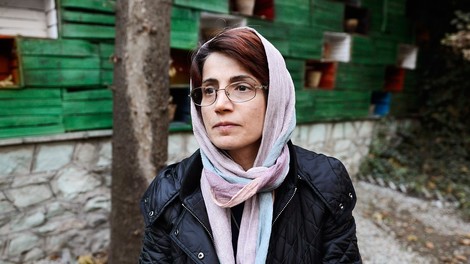Your podcast discovery platform
Curious minds select the most fascinating podcasts from around the world. Discover hand-piqd audio recommendations on your favorite topics.

piqer for: Globalization and politics Global finds
Sezin Öney, originally from Turkey, is based in Budapest and Istanbul. She her journalism career as a foreign news reporter in 1999 and she turned into political analysis as a columnist since 2007. Her interest in her main academic subject area of populism was sparked almost decade ago; and now she focuses specifically on populist leadership, and populism in Turkey and Hungary. She studied international relations, nationalism, international law, Jewish history, comparative politics and discourse analysis across Europe.
Iran’s Orwellian Arrest Of Its Leading Female Human Rights Lawyer
This was one of the news stories I completely missed: the arrest of Nasrin Sotoudeh, one of Iran's foremost human rights lawyers. As Robin Wright, the author of this article, conveys:
On Wednesday, Sotoudeh was abruptly roused from her home and arrested. Security officials informed her that she had been convicted—in absentia—and sentenced to five years, her husband, Reza Khandan, announced on Facebook. She was hauled away to the notorious Evin Prison.
It is not the first time that Sotoudeh has been imprisoned. Again in Wright's words:
In 2011, she was convicted of conspiring against state security and spreading propaganda after defending protesters arrested during the Green Movement uprising, in 2009. She was sentenced to eleven years, later reduced to six. Much of it she spent in solitary confinement. Sotoudeh went on two hunger strikes—the longest lasting forty-nine days—to protest prison conditions. For her “defense of human rights and freedom of thought,” the European Parliament awarded her the 2012 Sakharov Prize. She was pardoned after three years, shortly before the newly elected President, Hassan Rouhani, was due to speak at the United Nations, in 2013.
This time she was defending young women arrested during the "Girls of Revolution Street Protest". In these recent protests, female protesters took off their hijabs—head coverings required by law in Iran—and waved them at the end of sticks, "like a flag of liberation".
Wright quotes Hadi Ghaemi, the executive director of the "Center for Human Rights in Iran", based in New York, and he details the circumstances of her arrest as follows:
Her arrest was Orwellian, as the agents carrying it out claimed she has a five-year sentence in a case that has been decided in secret. She and her husband have no idea of when this prosecution took place, under what charges, and based on what evidence.
Will she spend years behind bars again? It also depends on international pressure: the other time she was released specifically because of this.
